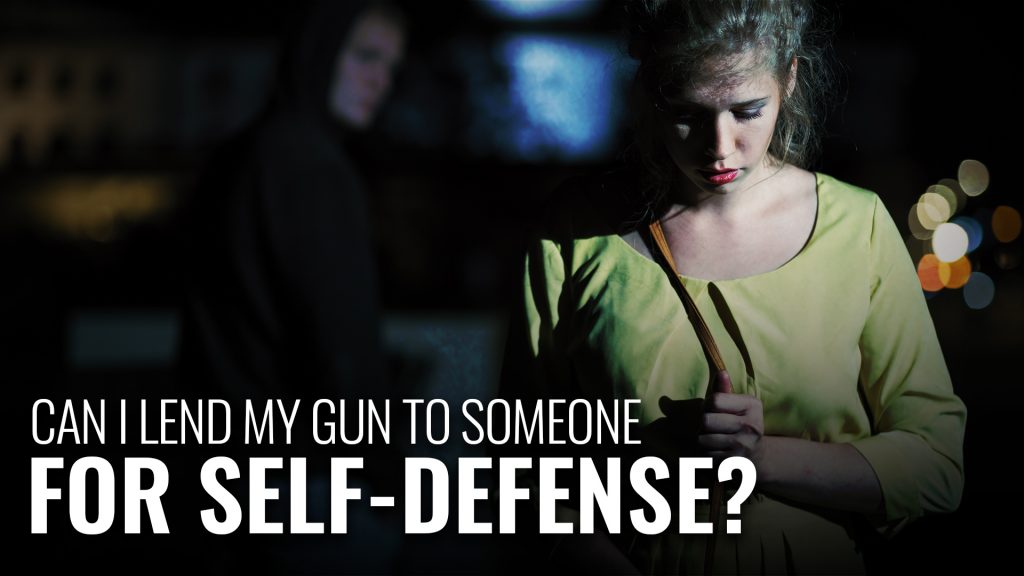
An often discussed topic among gun owners revolves around lending firearms to third parties. What are the legal issues that arise when we let others use our guns? For our purposes, and to narrow the discussion, we will break the issue down into three specific scenarios for illustration. These will show how a gun owner might lend their firearm who then uses that firearm in a self-defense situation.
Scenario #1: Can I Lend My Firearm?
First, lending a firearm to another who contemplates the need for such defense as the result of circumstances in their life, dictates a level of concern. Domestic violence situations where there is a temporary protective order issued are ripe for immediate need. Perhaps the scared and threatened individual does not own a firearm, and cannot obtain one through legal channels with the threat being so immediate. There is nothing wrong with allowing use of your firearm in these types of situations, with certain caveats. If the person does not have a CCW license, then the person should only have the firearm loaded in their home or openly carried. The firearm should never loaded in their vehicle.
Scenario #2: Can I Lend My Firearm?
Second, you allow another to use your firearm to take to the range, or perhaps shooting in the country. During the time they have your firearm, they come face-to-face with a deadly force situation and resort to using the firearm to defend themselves. Again, there is nothing illegal about the use of another’s firearm to defend themselves, as long as there is proper justification under Ohio self-defense law and/or the Castle Doctrine.
Scenario #3: Can I Lend My Firearm?
Thirdly, you are with other individuals and fear that death or great bodily harm is imminent to you and others in that location. A church service for example: The scene is rapidly getting dangerous, and you hand one of your firearms to another, a total stranger, in the heat of the moment, to help provide defensive measures. On its face, there is nothing illegal about doing this under these circumstances.
All of the above scenarios are very general, without the benefit of much, when it comes to the specifics and characteristics of the people involved. Thus, you must consider and apply the following to these and any other instances where you allow others to borrow your firearm.
What the law says
Generally speaking, there is nothing illegal about the use of another’s firearm in defense of oneself or others, as long as there is proper justification under Ohio self-defense law and/or the Castle Doctrine. That said, you must contemplate the age of the person you are loaning the gun to.
Generally, with some narrowly defined and very specific exceptions not really relevant here, only those over 18 can have long guns, and only those over 21 may possess handguns in Ohio. Know the age of the people involved, if possible. Furthermore, you should take steps to identify if the person’s criminal history prohibits them from taking the gun into their possession. This information about age and history, of course, may not be readily available in our emergency situation previously noted. There are some built-in protections in the law, such as a duress defense, which can be discussed at a later time.
Consider the risk
The lending of firearms, as we see, is perfectly legal in general terms, but comes with inherent risk. You are free to lend your firearms to other individuals, with a few restrictions. State and federal law prohibit certain people from possessing firearms. You must not knowingly lend your firearm to these people. For example, you must not lend to a convicted felon or someone who has been convicted of a crime of domestic violence.
As a general rule, never lend your firearm to anyone under the age of 18, as there are some specific requirements regarding when a minor may possess a firearm. Furthermore, you can be liable for loaning a firearm to a person who will not use or handle it in a responsible manner. For instance, never lend your firearm to someone who is under the influence of alcohol or controlled substances, or to someone you know suffers from mental illness or who is behaving erratically. Following these parameters will help keep you on the right side of the law.
As long as your friend is legally able to possess a firearm, and not displaying any behaviors that should tip you off to a problem, you would not be criminally or civilly liable if they are forced to use your firearm to defend themselves.
If it is discovered that you transferred possession to another person who then used that firearm in a negligent or reckless fashion, and there existed reasons why you should not have placed a firearm in their possession, you could be both criminally culpable and civilly liable.
If you have any questions about lending your handgun to a third party, contact U.S. LawShield and ask to speak with your Independent Program Attorney.
The post Can I Lend My Gun to Someone for Self-Defense? | Ohio appeared first on U.S. & Texas LawShield.
